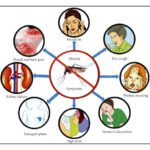
About Malaria Symptoms
Malaria symptoms can vary depending on the type of malaria parasite, the severity of the infection, and individual factors such as age, health status, and immunity. The disease is typically characterized by recurring episodes of fever, chills, and flu-like symptoms. Here’s a detailed breakdown:
- Fever: Fever is often the first and most common symptom of malaria. It typically develops in cycles, with fever spikes occurring every few days, depending on the type of malaria parasite. The fever can range from mild to severe and may be accompanied by sweating and chills.
- Chills: Chills often accompany the onset of fever in malaria. They may be intense and cause shivering and shaking.
- Headache: Headaches are another common symptom of malaria. They can range from mild to severe and may be accompanied by other symptoms such as nausea and vomiting.
- Muscle aches and fatigue: Many individuals with malaria experience muscle aches and weakness, along with general fatigue and malaise.
- Nausea and vomiting: Some people with malaria may experience nausea and vomiting, especially during fever episodes.
- Diarrhea: Diarrhea can occur in some cases of malaria, particularly in children.
- Jaundice: In severe cases of malaria, jaundice may develop, causing yellowing of the skin and eyes. This indicates liver dysfunction and requires immediate medical attention.
- Anemia: Malaria can lead to anemia due to the destruction of red blood cells by the malaria parasite. Symptoms of anemia may include weakness, fatigue, and pale skin.
- Splenomegaly and hepatomegaly: In some cases, the spleen and liver may become enlarged due to the accumulation of malaria parasites and the body’s immune response.
- Cerebral malaria: In rare cases, particularly with Plasmodium falciparum infection, malaria can progress to cerebral malaria, which is a severe complication characterized by altered consciousness, seizures, coma, and neurological deficits.
It’s important to note that malaria symptoms can be nonspecific and mimic those of other diseases, especially in the early stages. Therefore, if you experience symptoms such as fever, chills, and flu-like symptoms and have recently traveled to or live in an area where malaria is endemic, it’s important to seek medical attention promptly for proper diagnosis and treatment. Early diagnosis and treatment are crucial for preventing complications and reducing the risk of severe illness and death from malaria.
